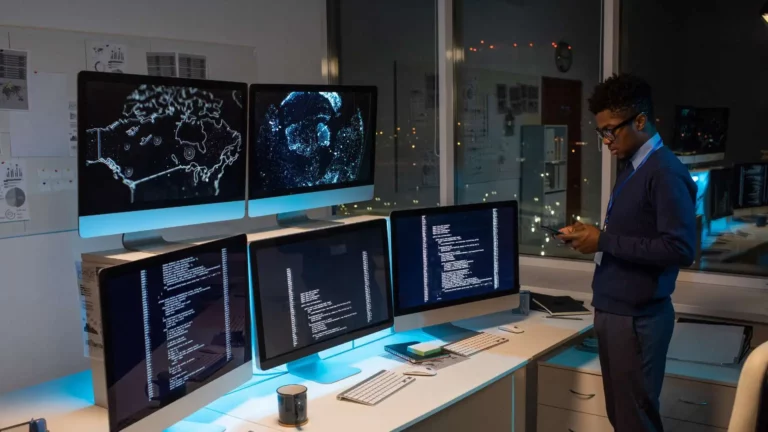AI is significantly changing the landscape of cybersecurity. It enables hackers to launch more advanced attacks and helps professionals improve their defenses. So, a common question arises: “Will AI replace cybersecurity jobs in the future?”
AI boosts cybersecurity by using advanced algorithms and machine learning. It analyzes vast data to spot patterns and anomalies, indicating potential threats. Consequently, 82% of IT leaders aim to invest in AI cybersecurity within two years. Meanwhile, nearly 48% have done so in 2023, per Blackberry’s report.
With the introduction of AI, there has been much discussion in the field of cybersecurity. Questions arise about its safety, its benefits to good or bad actors, and its future impact. For those in or entering the field, the key concern is whether AI will affect their jobs. This article examines contemporary AI. It discusses its relevance to today’s cyber security job market and how it could alter your cyber career.
Current Applications of AI in Cybersecurity
AI is now vital to many areas of cybersecurity, including:
- Threat Analytics: Organizations now have access to vast data on potential threats. This data helps them understand their risks. They appreciate AI technology for this added benefit.
- Vulnerability Management: Organizations can adopt various active and passive strategies today. AI can automate scanning and ranking efforts, especially for the most vulnerable areas.
- Independent handling: AI systems can handle some parts of an Incident Response Plan without human help. For example, they can collect data, log incidents, or contain issues.
- Malware Detection: AI can search emails and web pages. It can find phishing and malware better than security personnel who report phishing attempts.
Read related blog: Common Banking Scams and How to Protect Yourself
Benefits of AI in Cybersecurity
Including artificial intelligence in cybersecurity has some clear benefits:
- Enhanced Efficiency: The AI takes over tedious, repetitive tasks. This frees security staff to do strategic planning and handle complex investigations.
- Improved Threat Detection: AI can quickly analyze vast data. It can find tiny anomalies that are hard for humans to spot.
- Faster Response Times: AI defense systems could counter an attack far faster than humans, no matter how aggressive.
- Continuous Monitoring: AI systems can infinitely cover the operational scope in cyberspace. They can detect and prevent threats while reducing human error.
Potential Risks and Challenges of AI in Cybersecurity
AI offers many benefits, but it also has risks. Some of them:
- Incapable of Making Choices: AI recognizes patterns and analyzes large data sets. However, it falls short of making complex decisions like humans. AI isn’t reliable for decision-making.
- Prejudice of Some AI Technology: AI machine learning systems depend on their training data. Their responses to problems will also be flawed if the data is flawed.
- Emerging New Cyber Threats: Cyber-warfare enemies constantly change their strategies. AI-based defenses have weaknesses. These systems might not catch dynamic threats.
- AI Dependence: Relying too much on AI might make security team members careless. It’s crucial to understand these consequences.
Will AI Replace Cybersecurity Jobs?
Concerns that AI would move into the domain of cybersecurity are palpable. However, AI acting without human input is unlikely. It can analyze, identify, and oversee tasks. Yet, it lacks critical insight and the ability to make complex decisions.
The skills and expertise of cybersecurity professionals surpass AI’s capabilities. Thus, there will be no job losses. Instead, roles will evolve. Professionals will focus more on planning, troubleshooting, and overseeing AI devices.
Read related blog: Does Apple Pay Refund Money if Scammed?
Jobs Most Likely to Be Affected by AI in Cybersecurity
Other jobs in cybersecurity carry more threats from AI than others where there is little threat. For example, security analysts and system administrators are at higher risk. This is especially true as children learn to read, making these tasks easier to automate. However, AI is expected to enhance most jobs in this field. This boost will help security professionals with their analysis and strategies.
Skills Needed to Stay Relevant in an AI-Driven Cybersecurity World
To succeed in today’s work environment, where AI is taking over much of cybersecurity, professionals will need to:
- Data Analytics Skills: A key step in recognizing a threat is to analyze data on cybersecurity incidents. This skill is vital for making good decisions.
- Critical Thinking and Problem-Solving: AI tools can do many tasks, especially cybersecurity. But we still need humans to make decisions to handle cognitive work.
- Adaptability and Continuous Learning: The cybersecurity world changes every day. This means that security practitioners should be flexible enough and open to acquiring new knowledge and skills due to the transformations.
How to Adapt to AI Changes in the Cybersecurity Industry
Cybersecurity professionals can adapt to AI by:
- Embracing Continuous Learning: Keeping up with new AI tech in cybersecurity is vital.
- Upskilling and Reskilling: We must learn to use AI tools. We need skills for success in an AI-focused workplace.
- Focusing on Strategic Initiatives: With AI automating repetitive tasks, security staff can shift from execution to strategic planning, risk assessment, and threat hunting.
Read related blog: Will AI Replace Marketing Jobs?
The Future of AI and Cybersecurity Jobs
Utilizing Artificial Intelligence (AI) to secure cyberspace is now a core practice. The rise in cybercrime has driven this shift. AI helps detect, reduce, and prevent these threats.
Identifying artificial intelligence’s impact in the context of resolution is essential. It changes how organizations protect their data and assets. Yet, human experts are still needed for complex threats, ethical choices, and managing AI systems. As AI advances, cybersecurity workers must learn new skills, including AI programming and tackling advanced threats. This is crucial to staying relevant.
Read related blog: How to Spot Personal Loan Scams and Frauds: Best Tips | Beem
Conclusion
AI boosts cybersecurity specialists’ roles instead of replacing them. Its growing use shifts the view of AI in cybersecurity. Now, it’s seen as a tool for collaboration and partnership. Future cybersecurity jobs will rely on AI and human efforts to protect institutions from complex threats.
Learning, improving skills, and exploring new income sources can help you find financial security and happiness in cybersecurity. For financial help in your cybersecurity career, consider Beem for management and planning. Consider Beem’s Everdraft will help with your cash flow. Withdraw $10 – $1,000 of verified bank deposits early. There are no credit checks, interest, income restrictions, due dates, or tips. Download the app here!
FAQs on Will AI Replace Cybersecurity Jobs?
How will AI impact cybersecurity jobs?
AI won’t eliminate cybersecurity jobs. However, it will change them. Routine tasks will be automated. This shift lets professionals focus on strategic, creative thinking and data analysis.
What cybersecurity jobs are most at risk due to AI?
Jobs involving tedious tasks like log reviews, basic scans for vulnerabilities, and threat detection will likely be most affected by machines. However, AI will likely complement these measures.
How can cybersecurity professionals prepare for AI integration?
They can stay relevant by pursuing AI and machine learning, improving data analytics, and keeping up with new cybersecurity tech.















































